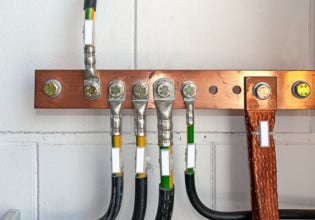When to Choose a Configurable Power Supply for your Design
Some power supply challenges simply cannot be met by an off-the-shelf solution. However, custom power supply units (PSUs) are not always the solution because working prototypes can lead to extensive testing, delays, and additional costs. An alternative approach to such challenges and drawbacks would be using a configurable power supply.
Some power supply challenges simply cannot be met by an off-the-shelf solution. However, custom power supply units (PSUs) are not always the solution because working prototypes can lead to extensive testing, delays, and additional costs.
An alternative approach to such challenges and drawbacks would be using a configurable power supply.
Custom and configurable power supplies are often assumed to be the same, but there are some very distinct differences.
Configurable power supplies, such as the one shown in Figure 1, are built from standard modules with clear specifications that have been thoroughly tested for performance and compliance. From these modules, the desired power supply is built.

Figure 1. Modular power supplies, such as those manufactured by MEAN WELL, can be an alternative to customized PSUs. Image used provided courtesy of Sager
On the other hand, a custom power supply is not built from tested modules but assembled at a more granular level from desired parts and components.
While this does provide extensive design freedom, it presents several issues, with the most prominent being the need for extensive PSU testing.
Power Supply Unit Design Issues
Some PSU designs involve equipment that can be used across different industrial and medical applications. There is rarely an off-the-shelf solution that meets all the design specifications for such situations.
For example, is nearly impossible to find a standard PSU that can simultaneously address key requirements such as:
- Size
- Ability to perform despite fluctuating temperatures
- Adjustable options to support common working voltages used in industry
In addition, retrofitting PSUs for old or aging equipment often requires a non-standard solution.
While custom PSUs can be developed, they come with their own set of limitations.
These limitations include additional testing that can delay the project timeline, extend the time to market, and overshoot the budget.
Extending the time to market alone is a serious problem in terms of competition and a reduced ability to respond to an engineer’s needs quickly.
Modular and Configurable Power Supplies
On the other hand, configurable power supplies take a modular approach where features and options are combined on top of a basic power supply model and chassis.
This approach supports nearly unlimited combinations of key options such as:
- Output voltage(s)
- Status and control signals
- Operating environments
Benefits of Implementing a Modular Power Supply
There are several benefits to using a modular power supply, including eliminating the issues with time and budgets that fully customized PSUs all too often lead to.
Additonally, such fully customized power supplies may only be required for one project or design, which means they fall under the category of NRE (non-recurring engineering); this is not a problem when a configurable power supply is used.
Modular power supplies are scalable as power needs change and they provide a high degree of flexibility for otherwise standardized applications.
Applications for Modular Power Supplies
There are several different industries and applications that make use of configurable power supplies, including equipment for telecommunications, biological facilities, and diagnostic facilities.
They have found widespread application in:
- Test and measurement systems
- Industrial machinery
- Mechanical and electrical equipment
- Laser equipment
Modular power supplies have proven an option for MRI, CT, and PET scanners in the medical industry, as illustrated in Figure 2.

Figure 2. MRIs are just one example of the range of applications that would benefit from the use of configurable power supplies. Image used courtesy of Pixabay
Modular power supplies are also becoming increasingly useful for older machines and systems where obsolescence is becoming a problem.
Choosing a Source for Configurable Power Supplies
When selecting a supplier for configurable power supplies, there are certain key characteristics to look for:
- Quick turnaround on quotes and prototypes
- No minimum order quantities required
- No set-up fees
- Extensive inventory of PSUs and PSU modules in stock
- Full test and integration capabilities
- Hassle-free factory warranties
- Certifications such as UL and ISO 9001:2015 certified Quality Management
- Ability to comply with industry-specific standards (i.e., 2x MOPP for medical applications)
Ensuring that these characteristics are addressed will reduce design time and production lead times while positively impacting the overall time-to-market.
Examples of Configurable Power Supplies from Sager
Sager is a distributor of configurable power supplies, such as the MEAN WELL 650W/1200W Modular Power NMP Series shown in Figure 1.
Model specifications include:
- Output modules that can deliver up to 240 W
- Cooling by a thermostatically controlled fan with a fan alarm function
- Complies with 2x MOPP between primary to secondary for Medical applications as well as ITE standards
- Protections for short circuit, overload, overvoltage, and over temperature
- Available with adjustable options for the major working voltages used in industry (i.e., 5 V, 12 V, 24 V, 48 V)
- Supports universal AC input/full range
- Engineered with a slim profile and 1 U height
Another option is the MEAN WELL 400W Flexible Configurable UMP Series in Figure 3, which can be configured into a multi-channel modular power supply. Specifications include:
- Fanless design with free air convection
- Slim profile and 1 U height
- Front-end can function as an independent 400 W 24 V or 48 V single output power supply
- Certified to ITE 62368-1 safety standards, design references IEC 60601-1 medical standard
- Protections for short circuit, overload, overvoltage, and over temperature
- Has adjustable options for the major working voltages

Figure 3. Some configurable power supplies are available in fanless models, such as the MEAN WELL 400 W UMP Series shown above. Image used courtesy of Sager
Beyond these specific products, MEAN WELL and Sager have an extensive inventory of modules for configurable PSUs and provide full test and integration capabilities.
In addition, they have critical UL and ISO certifications and can fully comply with industry-specific standards, and offer hassle-free factory warranties.
Considering a Configurable Power Supply
When a standard PSU does not meet design requirements and a custom PSU does not fit into a development timeline or budget, it may be time to think about a configurable power supply as a solution.
These modular power supplies support almost unlimited design options and provide scalability and flexibility in application. Configurable power supplies from Sager offer:
- Custom modifications, adjustment, and setpoints
- Power cycling and HALT testing
- Wire harnessing
- Series and parallel connections
- Enclosures to complete box builds.
Sager also provides quick-turn quotes and prototypes that will reduce design time and production lead times, and the overall time-to-market, and there are no minimum order quantities, design cycles, or set-up fees.
Learn more about Sager’s MEAN WELL configurable power supplies here.






